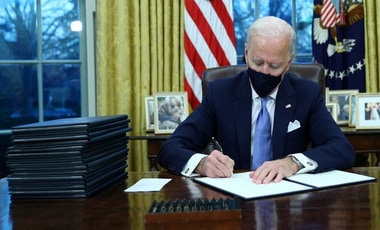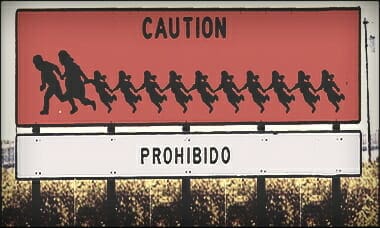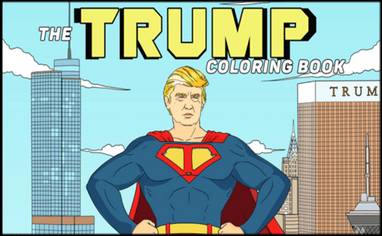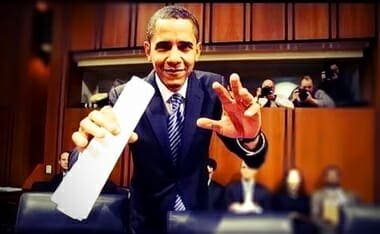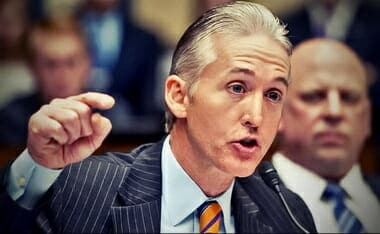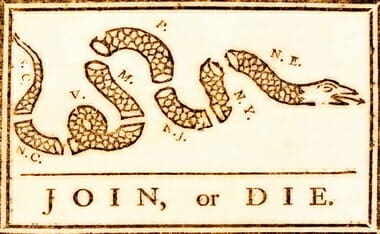Original Text
To the People of the State of New York:
HAVING reviewed the general form of the proposed government and the general mass of power allotted to it, I proceed to examine the particular structure of this government, and the distribution of this mass of power among its constituent parts. One of the principal objections inculcated by the more respectable adversaries to the Constitution, is its supposed violation of the political maxim, that the legislative, executive, and judiciary departments ought to be separate and distinct. In the structure of the federal government, no regard, it is said, seems to have been paid to this essential precaution in favor of liberty. The several departments of power are distributed and blended in such a manner as at once to destroy all symmetry and beauty of form, and to expose some of the essential parts of the edifice to the danger of being crushed by the disproportionate weight of other parts. No political truth is certainly of greater intrinsic value, or is stamped with the authority of more enlightened patrons of liberty, than that on which the objection is founded.
The accumulation of all powers, legislative, executive, and judiciary, in the same hands, whether of one, a few, or many, and whether hereditary, selfappointed, or elective, may justly be pronounced the very definition of tyranny. Were the federal Constitution, therefore, really chargeable with the accumulation of power, or with a mixture of powers, having a dangerous tendency to such an accumulation, no further arguments would be necessary to inspire a universal reprobation of the system. I persuade myself, however, that it will be made apparent to every one, that the charge cannot be supported, and that the maxim on which it relies has been totally misconceived and misapplied. In order to form correct ideas on this important subject, it will be proper to investigate the sense in which the preservation of liberty requires that the three great departments of power should be separate and distinct. The oracle who is always consulted and cited on this subject is the celebrated Montesquieu. If he be not the author of this invaluable precept in the science of politics, he has the merit at least of displaying and recommending it most effectually to the attention of mankind. Let us endeavor, in the first place, to ascertain his meaning on this point. The British Constitution was to Montesquieu what Homer has been to the didactic writers on epic poetry. As the latter have considered the work of the immortal bard as the perfect model from which the principles and rules of the epic art were to be drawn, and by which all similar works were to be judged, so this great political critic appears to have viewed the Constitution of England as the standard, or to use his own expression, as the mirror of political liberty; and to have delivered, in the form of elementary truths, the several characteristic principles of that particular system. That we may be sure, then, not to mistake his meaning in this case, let us recur to the source from which the maxim was drawn. On the slightest view of the British Constitution, we must perceive that the legislative, executive, and judiciary departments are by no means totally separate and distinct from each other. The executive magistrate forms an integral part of the legislative authority. He alone has the prerogative of making treaties with foreign sovereigns, which, when made, have, under certain limitations, the force of legislative acts. All the members of the judiciary department are appointed by him, can be removed by him on the address of the two Houses of Parliament, and form, when he pleases to consult them, one of his constitutional councils. One branch of the legislative department forms also a great constitutional council to the executive chief, as, on another hand, it is the sole depositary of judicial power in cases of impeachment, and is invested with the supreme appellate jurisdiction in all other cases. The judges, again, are so far connected with the legislative department as often to attend and participate in its deliberations, though not admitted to a legislative vote. From these facts, by which Montesquieu was guided, it may clearly be inferred that, in saying “There can be no liberty where the legislative and executive powers are united in the same person, or body of magistrates,” or, “if the power of judging be not separated from the legislative and executive powers,” he did not mean that these departments ought to have no PARTIAL AGENCY in, or no CONTROL over, the acts of each other. His meaning, as his own words import, and still more conclusively as illustrated by the example in his eye, can amount to no more than this, that where the WHOLE power of one department is exercised by the same hands which possess the WHOLE power of another department, the fundamental principles of a free constitution are subverted. This would have been the case in the constitution examined by him, if the king, who is the sole executive magistrate, had possessed also the complete legislative power, or the supreme administration of justice; or if the entire legislative body had possessed the supreme judiciary, or the supreme executive authority. This, however, is not among the vices of that constitution. The magistrate in whom the whole executive power resides cannot of himself make a law, though he can put a negative on every law; nor administer justice in person, though he has the appointment of those who do administer it. The judges can exercise no executive prerogative, though they are shoots from the executive stock; nor any legislative function, though they may be advised with by the legislative councils. The entire legislature can perform no judiciary act, though by the joint act of two of its branches the judges may be removed from their offices, and though one of its branches is possessed of the judicial power in the last resort. The entire legislature, again, can exercise no executive prerogative, though one of its branches constitutes the supreme executive magistracy, and another, on the impeachment of a third, can try and condemn all the subordinate officers in the executive department. The reasons on which Montesquieu grounds his maxim are a further demonstration of his meaning. “When the legislative and executive powers are united in the same person or body,” says he, “there can be no liberty, because apprehensions may arise lest THE SAME monarch or senate should ENACT tyrannical laws to EXECUTE them in a tyrannical manner. ” Again: “Were the power of judging joined with the legislative, the life and liberty of the subject would be exposed to arbitrary control, for THE JUDGE would then be THE LEGISLATOR.
Were it joined to the executive power, THE JUDGE might behave with all the violence of AN OPPRESSOR. ” Some of these reasons are more fully explained in other passages; but briefly stated as they are here, they sufficiently establish the meaning which we have put on this celebrated maxim of this celebrated author…
(The Library of Congress)

Modern English ~ Interpolation
Having reviewed the general form of the proposed government and the power allotted to it, I will now examine the specific structure of this government and the distribution of its total power among its parts.
Critics: Violates Separation Maxim
2. One major objection made by the more respectable adversaries to the Constitution is its supposed violation of the political maxim that the legislative, executive, and judiciary departments should be separate and distinct.
It is said that the structure of the federal government doesn’t seem to have this essential precaution in favor of liberty. The powers are distributed and blended in a manner that destroys all symmetry and beauty of form, and exposes some essential parts of the government to the danger of being crushed by the disproportionate power of other parts.
Separation of Powers, Liberty
3. This objection is based on a political truth with the greatest intrinsic value and endorsed by the most enlightened patrons of liberty. The holding of all powers—legislative, executive, and judiciary—in the same hands, whether by one person, a few, or many, and whether hereditary, self-appointed, or elective, is the very definition of tyranny. Therefore, if the federal Constitution combined powers, or mixed powers in a way that tended to lead to a dangerous accumulation, no further arguments would be necessary to inspire a universal rejection.
I believe, however, that it will become clear to everyone that the charge cannot be supported and the maxim it relies on has been totally misunderstood and used incorrectly.
In order to make an informed judgment on this important subject, it is proper to investigate why the preservation of liberty requires that the three great departments of power should be separate and distinct.
Political Scientist, Montesquieu, Recommends Separation of Power
4. The expert always quoted on this subject is the famous Montesquieu. If he didn’t discover this invaluable precept in political science, he can be credited, at least, with effectually recommending it to mankind. Let’s try to discover his meaning.
Maxim in British Constitution
5. The British Constitution was to Montesquieu what Homer has been to the didactic writers on epic poetry. As poets consider the work of the immortal bard as the perfect model from which the principles and rules of the epic art were drawn, and the standard used to judge all similar works, so has the great political critic, Montesquieu, viewed the Constitution of England as the standard. Or, to use his words, it is the mirror of political liberty. It contains several elementary truths, principles that are part of the British system. So that we make no mistakes interpreting his meaning, let’s return to the source from which the maxim was drawn.
Powers Mixed in British Constitution
6. A brief look at the British Constitution reveals that the legislative, executive, and judiciary departments are not totally separate and distinct from each other.
The chief executive is an integral part of the legislative authority. He, alone, makes treaties with foreign sovereigns that have, under certain limitations, the force of legislative acts. All the members of the judiciary department are appointed by him, can be removed by him on petition by the two Houses of Parliament, and become, when he wants to consult them, one of his constitutional councils.
One legislative house also forms a constitutional council to the executive chief, at the same time that it is the sole depository of judicial power in cases of impeachment, and is the supreme court of appeals in all other cases.
The judges, again, are so connected with the legislative branch that they often attend and participate in its deliberations, though they cannot vote.
No One Has Total Power of Two Branches
7. From these facts, which guided Montesquieu, it may be inferred that, in saying “There can be no liberty where the legislative and executive powers are united in the same person, or body of magistrates,” or, “if the power of judging be not separated from the legislative and executive powers,” he didn’t mean that the government’s branches should have no partial agency in, or no control over, the acts of each other. His words and examples make his meaning clear: when the whole power of one branch is in the same hands as the whole power of another branch, the fundamental principles of a free constitution are subverted.
This would have been true in the British constitution if the king, who is the sole executive magistrate, also held the complete legislative power, or the supreme administration of justice; or if the entire legislative body was also the supreme judiciary, or the supreme executive authority. This, however, is not among the vices of that constitution.
The chief executive cannot, himself, make law, though he can veto every law; he cannot personally administer justice, though he appoints those who administer it.
The judges can exercise no executive power, though the executive chooses them. Nor any legislative function, though they may be advised by legislative councils.
The entire legislature can perform no judiciary act, but joint acts of the two houses of the legislature can remove a judge from office, and one house has the judicial power of final appeal. The entire legislature, again, can exercise no executive prerogative, though one house constitutes the supreme executive magistracy, and the other, after an impeachment vote by one third, can try and condemn all the subordinate officers in the executive department.
Liberty Demands “Separation” Maxim
8. Montesquieu’s reasons for his maxim further demonstrate his meaning.
“When the legislative and executive powers are united in the same person or body,” says he, “there can be no liberty, because apprehensions may arise lest the same monarch or senate enact tyrannical laws to execute them in a tyrannical manner.”
And: “Were the power of judging joined with the legislative, the life and liberty of the subject would be exposed to arbitrary control, for the judge would then be the legislator. Were it joined to the executive power, the judge might behave with all the violence of an oppressor.”
Some of the reasons are more fully explained in other passages. But, even briefly stated as here, they establish the meaning of this celebrated maxim of this celebrated author….
Mary E. Webster, ed., The Federalist Papers In Modern Language for Today’s Political Issues (Bellevue, WA: Merril Press, 1999), cf., Federalist 47, 197-199.
